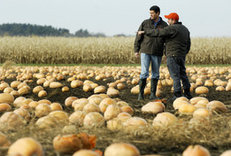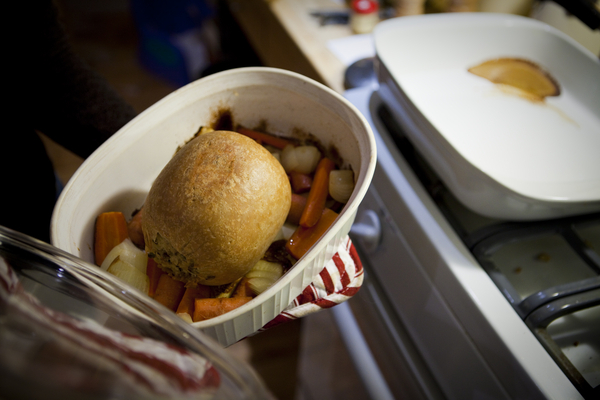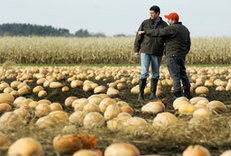 Paul Bakus in a ruined pumpkin patch.Photo: Wonk Room
Paul Bakus in a ruined pumpkin patch.Photo: Wonk Room
Cross-posted from the Wonk Room.
Our increasingly extreme climate is devastating American agriculture. Hurricanes Katrina and Rita, strengthened by global warming, caused $1.6 billion in agriculture damage in Louisiana alone. Now it appears that a Thanksgiving mainstay — pumpkin pie — is next on the global boiling hit list. On Tuesday, Nestle Baking, “which controls about 85 percent of the pumpkin crop for canning, issued a rare apology and said that rain appeared to have destroyed what remained of a small harvest this year and that it expected to stop shipping the holiday staple by Thanksgiving.” Paul Bakus, vice president and general manager of Nestle Baking, bemoaned the devastating rains that made it impossible to harvest the Morton, Illinois pumpkin crop used for Libby’s canned pumpkin:
If only we could have changed the weather. We hope Mother Nature is nicer to us next year, hopefully delivering less rain and more sunshine.
In addition, waffles are on the hit list, as supplies of Eggos are disappearing. “Heavy rains that soaked Atlanta last month knocked out Kellogg’s waffle operations,” ABC News reported on Tuesday. September’s epic flooding actually exacerbated a shutdown caused by an earlier virulent outbreak of the deadly bacteria Listeria monocytogenes. Kellogg’s initially only referred to the food poisoning threat as “equipment issues,” preferring to let global boiling take the blame.
Unfortunately, we have changed the weather.
“2009 continues to climb up the rainiest-years-ever chart” in Illinois. This year’s rainfall in Peoria of 49.34 inches — 50 percent above normal — has already exceeded the total of 2008, itself 25 percent above normal. With only six more inches of precipitation, 2009 will break the record rainfall set in 1990.
Similarly, the Sept. 21 flood in Atlanta, Ga. “was worse than what’s statistically projected to happen once every 100 years — even worse than every 500 years.” It was “extremely rare”, “epic” and so “stunning,” the U.S. Geological Survey says the “flood has defied its attempts to define it.”
This kind of extreme precipitation is part of the changes to our climate wrought by global warming, which increases the amount of water vapor the atmosphere can hold and changes circulation patterns. As the U.S. Global Change Program reported in June, 2009 on the impacts of climate change in the Midwest and the Southeast:
– In the Midwest, both summer and winter precipitation have been above average for the last three decades, the wettest period in a century. The Midwest has experienced two record-breaking floods in the past 15 years.
– According to climate models, precipitation in the Midwest is projected to increase in winter and spring, and to become more intense throughout the year.
– In the Southeast, average autumn precipitation has increased by 30 percent for the region since 1901. There has been an increase in heavy downpours in many parts of the region.
Update: LinkTV discusses the “fluke storm” in Georgia “that killed almost a dozen people.” Scientists say “weather this extreme is becoming the norm, due to rising global temperatures”:



